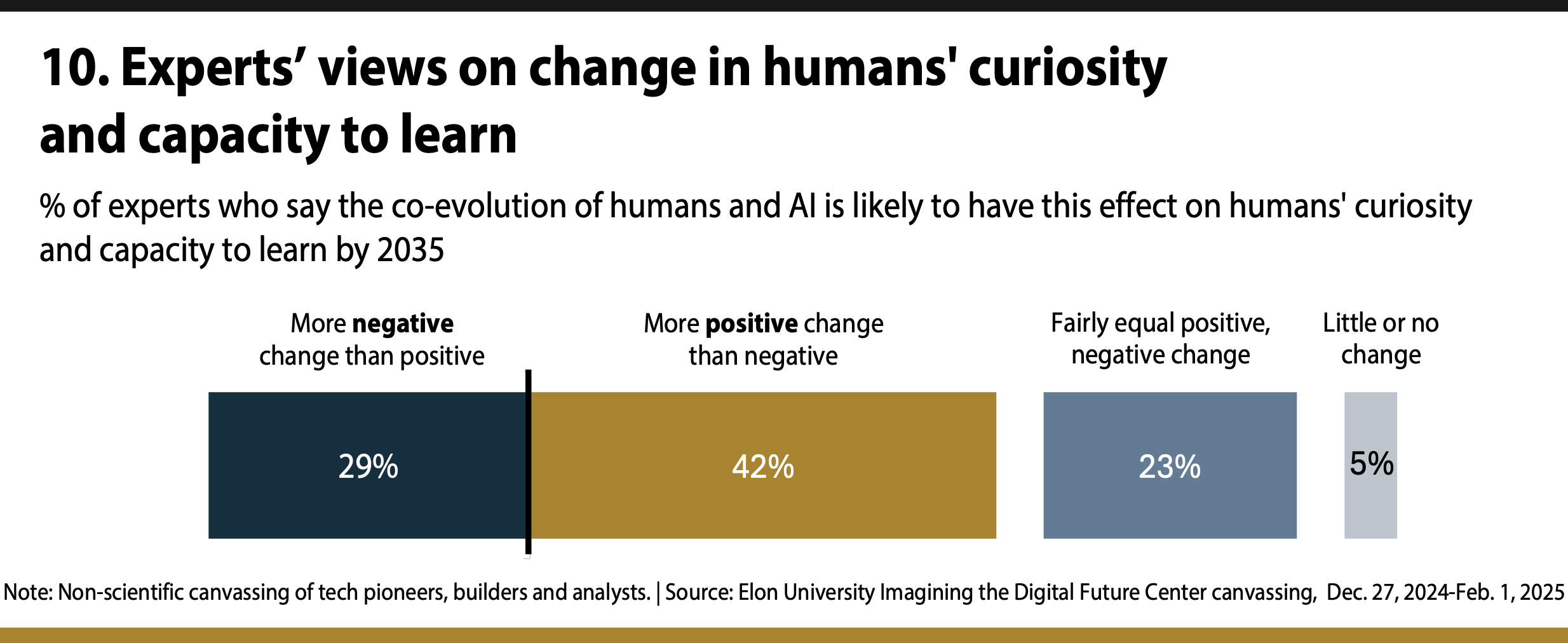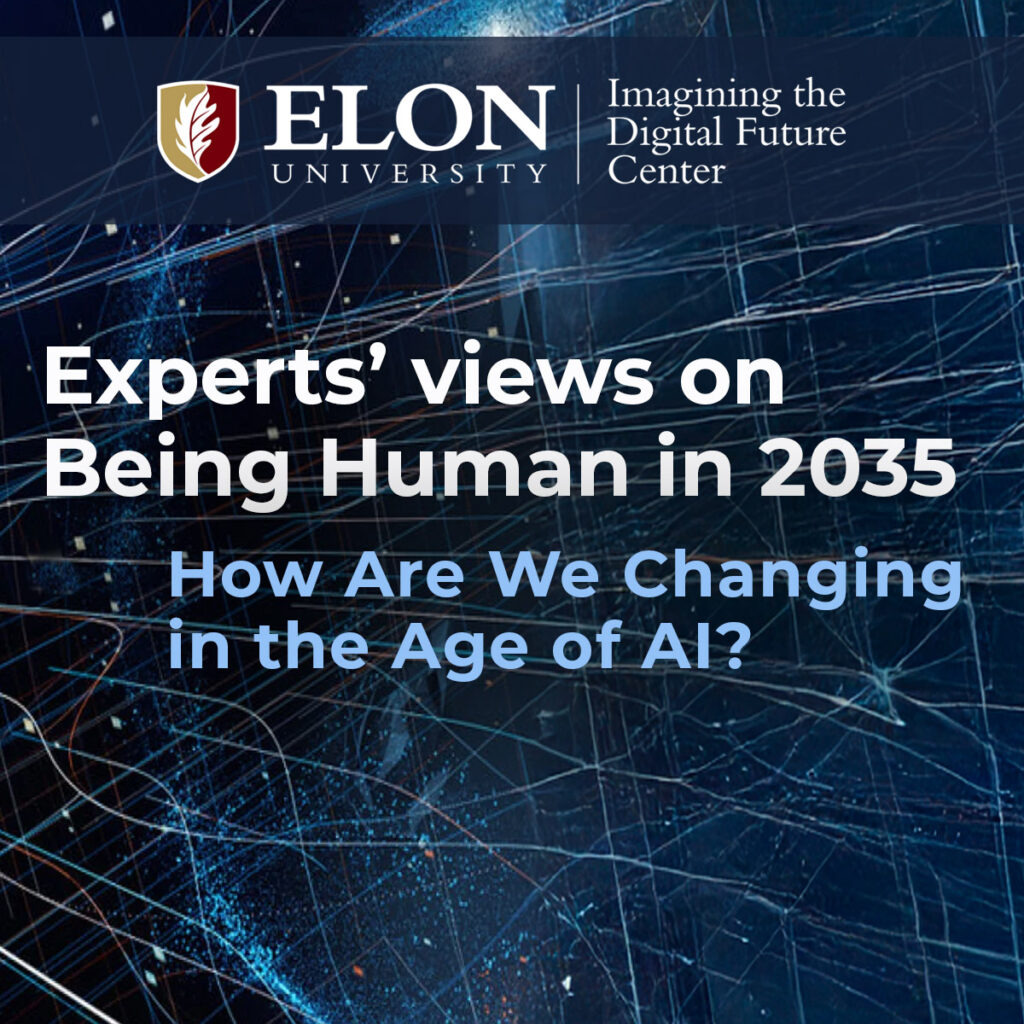

These experts expected in 2025 that by 2035 there will be…
29% – More negative change than positive change
42% – More positive change than negative change
23% – Fairly equal positive and negative change
5% – Little to no change
The experts’ views were more likely to be positive than negative about the effect AI will have on curiosity and the capacity to learn. While very few of the people who wrote essay responses mentioned this category as growing in strength as a human trait by 2035, many expect that people’s implementation of AI and the knowledge gained through the use of AI tools will expand their personal capacity for learning and motivate them to be more curious than when they are operating under the power of their own human capabilities alone. Many of the essayists also expressed concerns that humans’ growing dependence on AI systems will narrow their cognitive experience to the point at which they simply outsource their essential selves to machine outputs. They fret about atrophy of humans’ capacity to learn as their innate curiosity dampens.
A selection of related quotes extracted from these experts’ longer essays:

“Today‘s AI provides much-improved search capabilities, better to read and with more knowledge. It allows me to expand my curiosity. I can ask it, ‘What about this? Explain that in terms I can understand,’ and so on. I‘m not a scientist nor am I an environmentalist, but AI can help me understand the damaging significance of methane when compared with CO2. It can visualize the size of the block of carbon produced as a result of a flight I take across the country or around the world. What I do with that visualization is up to me.” – Tom Wolzien, inventor, analyst and media executive

“LLMs can be programmed to reveal uncharted territory if we are well-versed in interacting with them effectively to harness that potential. And they do not preclude the teaching of curiosity and fundamentals. … Interaction with these tools – for that is what they are – can engender new energy within humans toward the exploration and iterative development of new ideas. The offshoot side effect of ‘creativity‘ inspired by working with AI models can increase our appreciation for the distinct beauty and value of naturally-derived human output. The offshoot side effect of creativity inspired by working with AI models can increase our appreciation for the distinct beauty and value of naturally-derived human output.” – Keram Malicki-Sanchez, Canadian founder and director of VRTO Spatial Media World Conference and the Festival of International Virtual and Augmented Reality Stories

“If we follow the path we are on, the unintended negative consequences of AI will swamp the benefits for society. We will discount critical thinking and reward just-in-time learning above multidisciplinary, experiential, contextual decision-making. Can our innate curiosity save us from an AI-reliant post-truth dystopia? The human attention budget allows us to make routinized decisions which never rise to the level of consciousness. I am not so worried about potential human laziness – curiosity counteracts that – but about our growing reliance on AI-asserted ‘facts.’ AI crutches become one less debit to individuals’ attention budgets. … Will AI be used as a tool to catalyze curiosity and what could be? I have no idea. … In 2035, are we going to have AI tools that feed human curiosity, or will we be reliant on AI crutches?” – Rosalie R. Day, co-founder at Blomma, a platform providing digital solutions to clinical research studies

“When we use AI to accomplish tasks we have already mastered, it can create economies of scale that allow humans to focus on more important and meaningful work. Inversely, if we use AI before we learn how to do those tasks ourselves, it will rob us of important scaffolding and the experience of learning by doing. For example, AI does an amazing job at synthesizing and summarizing existing text. However, if we don‘t teach our children the process of summarizing and synthesizing text for themselves, we rob them of a chance to deepen their ability to think critically.” – Pamela Wisniewski, associate professor in human-computer interaction and fellow in engineering at Vanderbilt University

“Studies show that active curiosity is born of a capacity to tolerate the stress of the unknown, i.e., to ask difficult, discomfiting, potentially dissenting questions. Innovations and scientific discoveries emerge from knowledge-seeking that is brimming with dead ends, detours and missteps. Complex problem-solving is little correlated with intelligence; instead, it’s the product of slow-wrought, constructed thinking. But today, our expanding reliance on technology and AI increasingly narrows our cognitive experience, undermining many of the skills that make us human and that help us progress.” – Maggie Jackson, award-winning journalist and author who explores the impact of technology on humanity

“Generative AI technologies allow us to use knowledge that is beyond us without helping us appreciate what we know or don‘t know. In fact, it devalues the virtue of humility. Humility ensures that we value the creation of new knowledge, that we are awed when other people do things we cannot or did not think to do, and that we take the time to embrace curiosity and deep listening. Generative AI gives us the illusion that we need not be limited by our own experiences and education, that we can simply access all collective knowledge the AIs have been trained on (which is not actually all knowledge). Awareness of our limitations enables us to be more open and tolerant, to seek out and collaborate with people from different backgrounds, and to want to be more well-rounded humans. If we design our generative AI interfaces to obscure our lack of knowledge and ability, I fear we will diminish a key aspect of our humanity and our civic capacity.” – Erhardt Graeff, educator, social scientist and public interest technologist at Olin College of Engineering

“The future of humans and AI is a future of humans and humans, in which AI facilitates some connections, hinders others and reshapes how we exchange knowledge and information just as predecessor information technologies have done. The impact of these advances will be shaped by the literacies we develop and the skills with which we approach these processes and each other as ever-changing humans in an ever-changing world.” – Denis Newman Griffis, lecturer in data science, University of Sheffield, UK


